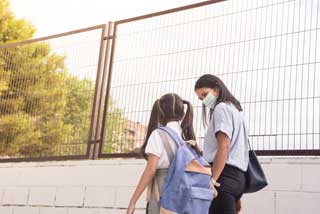The Word from Lansing: During Pandemic, Catholic Schools Rise to the Challenge

Posted April 30, 2021
Every year at the end of January, Catholics across the country observe Catholic Schools Week. The celebration, usually marked by service projects and activities to build camaraderie and school spirit, honors the quality, values-based education offered by Catholic schools. While the COVID-19 pandemic changed how staff and students were able to celebrate this year, it also clearly emphasized the significant impact schools have on Michigan families, especially during difficult times. One example of this impact is mentioned in a resolution passed by state lawmakers in January: “Catholic schools provided nearly uninterrupted instruction to their students during state-mandated pandemic school building closures” (Senate Resolution 6 of 2021 and House Resolution 21 of 2021).
That nearly uninterrupted instruction has mattered a great deal for students attending Catholic schools. In the midst of dramatic changes caused by the pandemic, Catholic schools have been a consistent, positive presence for many families. Administrators and staff have implemented vigorous safety measures to prevent the spread of COVID-19, including social distancing, physical barriers for desks, mask policies, and sanitation stations. They have spent countless hours seeking creative solutions to ensure that academic growth continues in their students, despite the unpredictability of the virus. And recognizing the severe mental health outcomes that have arisen during this difficult time, they have also worked to provide safe, in-person schooling options or opportunities for virtual connection whenever possible.
The financial investment these schools have made has not gone unnoticed. In December 2020, the U.S. Congress passed a $900 billion coronavirus relief bill that was signed into law by then-President Donald Trump. Included within the package was approximately $2.75 billion for the Emergency Assistance to Non-public Schools (EANS) program for states to opt-into, which will assist nonpublic schools with costs associated with the COVID-19 pandemic, such as personal protection equipment, learning recovery programs, and cleaning supplies. Michigan Catholic Conference (MCC) encouraged Governor Whitmer’s office to apply for Michigan’s share of the funds—almost $87 million—and expressed its gratitude when the request was made.
Michigan Catholic Conference, in partnership with the Michigan Association of Non-public Schools (MANS), has collaborated with the Michigan Department of Education to develop a plan for grant submission and the distribution of funds. The three organizations have also assisted nonpublic schools by sharing information about the funding’s availability and the application process. Even though the money was awarded to the state, the Michigan Legislature is required to appropriate the funds through a budget bill in order for them to be disbursed. Nearly 1,300 grassroots messages were sent to lawmakers through MCC’s grassroots email network requesting the funding be approved. Members of the House and Senate have expressed support for the appropriation and have included it in supplemental budget bills to be disbursed before October 1 of this year. Unfortunately, disagreements between the Legislature and the Governor’s office have brought about uncertainty about the funding for schools, including two vetoes.
These disagreements are holding up needed aid for schools in order to keep Michigan children safe. Coming to an agreement is critical, especially as a new round of federal COVID relief signed into law by President Joe Biden provides additional aid for Michigan schools, public and nonpublic. Student needs must come before politics.
Prior to the pandemic, MCC has been a strong advocate for caring for all students, regardless of the type of school they attend. Over the last several years, the Conference championed the inclusion of funding in the state budget to assist nonpublic schools with costs related to State health, safety, and welfare requirements. These requirements included maintaining vaccination records, conducting criminal background checks on school staff, and taking attendance. While the funding has been a topic of discussion before the Michigan courts due to the state’s strict limits on aid to nonpublic schools, Michigan’s Supreme Court recently upheld a lower court ruling that the funding is constitutional.
The past thirteen months have been difficult, but Catholic schools have risen to the challenge to make a positive difference for families. MCC will continue to urge elected officials in Lansing to recognize their effort and to put the safety of all students first.
For the latest updates on the EANS funding, visit www.micatholic.org.
